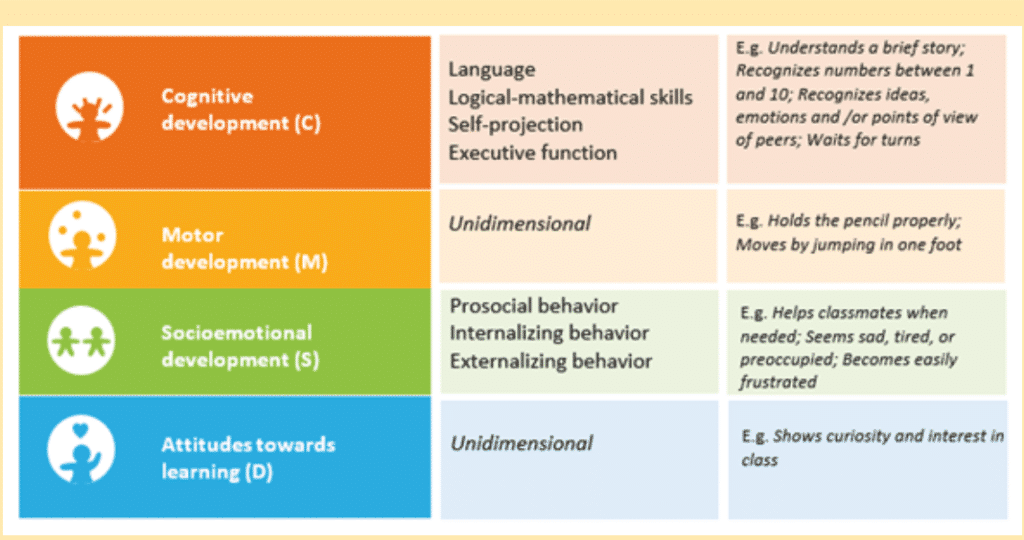Child development assessment through INDI
The Uruguayan Child Development Inventory (in Spanish: Inventario de Desarrollo infantil –INDI-) is child development and school readiness teacher report screening instrument. INDI evaluates a wide range of developmental areas at ages 3-6. Conceptually, it follows a multidimensional approach to school readiness, including the assessment of cognitive development (Language, Logical-mathematical skills, Self-projection, and Executive function subscales), motor development, socioemotional development (Prosocial, Externalizing and Internalizing behavior subscales) and attitudes towards learning (see Figure 1).

Figure 1. INDI´s developmental dimensions, subscales, and sample items.
Some of the main contents include: for the Language subscale, receptive and productive skills, articulatory and pragmatic aspects of language development, phonological awareness, and early-literacy skills. For the Logical-mathematical subscale, numeracy, relation, and operation skills. Self-projection subscale involves theory of mind, episodic memory, and temporal cognition constructs. Executive functions subscale includes self-regulation, inhibitory and attentional control as well as cognitive flexibility. The Motor development dimension includes gross and fine motor skills. Socioemotional development considers cooperation and empathic behavior, as well as anxious-withdrawn and aggressive-defiant indicators. Finally, Attitudes towards learning evaluates school adaptation, persistence, creativity, and intrinsic motivation.
INDI´s features as a child development assessment system
INDI´s assessment system was first developed in 2015 by our research team at Universidad de la República (Uruguay), in collaboration with public and private educational agents.
In 2018, preschool grades 4 and 5 from the public education context were assessed nationwide through INDI, as well as preschool grade 3 in 2019. Several features and actions have contributed to INDI´s widespread use:
- Norm-referenced. Information from representative Uruguayan samples makes it possible to interpret INDI´s results based on the score distribution of Uruguayan children that share the same age and preschool level.
- Online administration and the automatic report system offer immediate feedback following teachers´ upload of the responses.
- Continuous training of educational agents on the purposes and interpretation of child development information offered through this instrument (training meetings, digital resources and tutorials, publications).
- Exchange with educational policy authorities, including the presentation of periodic reports.
INDI reports and use of results
INDI´s reports provide immediate feedback on developmental strengths and weaknesses at individual, group, school, and regional levels. Different report versions are aimed at teachers, principals, and supervisors, so that developmental profile information is available for educational intervention planning at all levels.
Reports include the analysis of cross-sectional and intraindividual variability, as well as developmental trajectory information of the children. Furthermore, following Multi-Tiered System of Supports (MTSS), individual cases identified with a high-risk developmental profile are integrated into a prioritized health attention protocol.
Further information
Coverage about INDI in English:
Fatherly: Preschoolers Had More Developmental Delays During the Pandemic, Study Shows
More information on school readiness’ theoretical background available here (in Spanish) https://indi.ei.udelar.edu.uy/dpe/
More information on how to administer the INDI and about the automatic report system available here (in Spanish) https://indi.ei.udelar.edu.uy/recursos/
Some of our publications are available in English here: https://indi.ei.udelar.edu.uy/publicaciones/
Vásquez-Echeverría, A. (2022). (Ed.). El Inventario de Desarrollo Infantil y la evaluación sistemática del desarrollo en contextos educativos. Teoría, creación e implementación. Universidad de la República. Available here (In Spanish) Libro-INDI-2022
Contact us: indi@pedeciba.edu.uy
